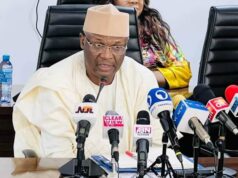The Independent National Electoral Commission, INEC, has given itself thumbs up on the conduct of the 2023 general elections given the outcome of ongoing litigations at the election tribunals.
According to the commission, of the 1,196 petitions filed after the polls, “712 were dismissed and 179 withdrawn. This means that in 891 cases (74.4%), the tribunals found no merit in the petitions and affirmed the result of the elections conducted by INEC.”
 Advetorial
Advetorial
National Commissioner & Chairman, Information and Voter Education Committee of the INEC, Mr. Sam Olumekun, said this, yesterday, in response to a report that INEC’s credibility had been allegedly harmed by 94 per cent of the 1,280 contested posts being challenged at the tribunals.
Olumekun said instead of 1,280 constituencies as reported, elections were conducted in 1,491 constituencies across the country made up of 1 Presidential, 28 Governorship. 109 Senatorial, 360 House of Representatives and 993 State Assembly constituencies.

He said INEC should not be blamed for pre-election cases arising from the conduct of primary elections by political parties because “tese are intra-party cases involving party members in which they join the Commission and seek for reliefs binding on it. As everyone knows, INEC does not conduct primaries for political parties.”
He continued: “In pursuit of their right under the law, many litigants in Nigeria unfortunately file election petitions over the most improbable cases and later withdraw them or they are dismissed by the tribunals. If the report had taken time to analyse the outcome of the cases decided so far by the tribunals, it would have discovered that out of 1,196 petitions, 712 were dismissed and 179 withdrawn. This means that in 891 cases (74.4%), the tribunals found no merit in the petitions and affirmed the result of the elections conducted by INEC. It is surprising how the mere filing of petitions constitute a blot on the integrity of the recent elections conducted by INEC when in fact they constitute an integral part of the democratic process.”

Besides, Olumekun said petition is not only against the conduct of the election itself because “the grounds for challenging the outcome of an election as provided in Section 134 of the Electoral Act, 2022 are not limited to the conduct of election by the Commission. An election may be questioned on the ground that the winner of the election was not qualified to contest the election by virtue of his academic qualifications, age etc. Many of the petitioners did not challenge the conduct of the elections by INEC but the eligibility of candidates or their nomination by political parties. Under the law, INEC has no power to screen candidates. Similarly, only the Courts can disqualify candidates.”


















